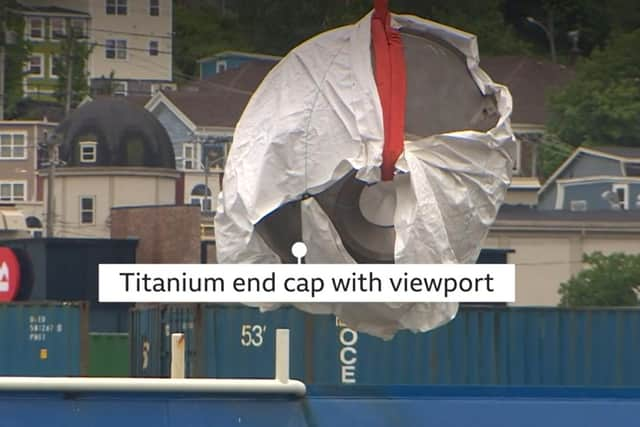Belfast Polaris submarine veteran likens Titanic wreck tourism to sifting through the remains of the Twin Towers after 9/11: 'It is not a tourist attraction'
and live on Freeview channel 276
Chris Batten, a 65-year-old Belfast man, also spoke about the dreadful mechanics of underwater implosion, saying that despite being surrounded by ocean the occupants could have been incinerated because the air inside imploding submarines has been known to compress so fast it generates extreme heat.
He was speaking as salvage crews said they believe they have found “presumed human remains”.
Advertisement
Hide AdAdvertisement
Hide AdThese had been “carefully recovered within the wreckage at the site”, said the US Coast Guard.
Mr Batten joined the Royal Navy aged 16, and left at age 40 with the rank of “chief artificer” (he basically looked after the computers which controlled the torpedos).
He is one of the roughly 40 members of the NI Submariners’ Association.
He was unimpressed with the carbon-fibre construction of the vessel hull, saying: “It was always an accident waiting to happen.
Advertisement
Hide AdAdvertisement
Hide Ad"Since time immemorial submarines were made of metal, and this cowboy decides to make them out of [carbon] fibre.


"There’s 100 years of submarines, and this guy decides to go a different route. He goes completely against all knowledge, ignores it.
"He puts a stupid comment out that he doesn’t want any 50-year-old submariners – he wants people who could ‘inspire’.
"Twelve years of development of a submarine, against 100 years of experience.”
Advertisement
Hide AdAdvertisement
Hide AdHe added that, in an extreme compression event, implosion can be so quick it “vapourises everything… it’s all over within half of a second”.


The remains they found could be as little as “a bit of charred bone – it won’t be anything that resembles a human being”.
But when he was serving on a sub deep in the Atlantic, there was a feeling among crew that, if you had to die, “you want to be imploded”.
The alternative was the vessel surviving in a damaged state, leaving its crew to drown or asphyxiate over a long period of time, as happened with the Kursk disaster in 2000 in the Russian Arctic, costing 118 lives.
Advertisement
Hide AdAdvertisement
Hide AdMr Batten said that if there’s anything to be learned from the tragedy it is that people would “think twice” about such tours.
If tourists had taken trips into the remains of the Twin Towers after 9/11, he said, “looking at people’s shoes and wallets and lunchboxes and everything on the ground, it would have been abhorrent, and it’s a similar thing here – it’s not a tourist attraction”.
He also directed the News Letter to a tweet from former sailor @RenownVet01, indicating that his was a view shared by many former Royal Navy people.
"We trained hard and constantly to operate safely in a lethally dangerous environment,” read the tweet.
Advertisement
Hide AdAdvertisement
Hide Ad"We did it for serious reasons other than being a bored rich guy.
"After multiple disasters costing the lives of our brothers, time and money and skull sweat went into making our boats safer.
"Even so, we worked in that dangerous place where death was one mistake away.
“We dealt with it with a dark, twisted humor.
“Along comes Richie Rich, and spits on us, scoffs at the safety which was second nature to us, brags about how he disregarded safety and broke the rules we mere mortal engineers found necessary.
Advertisement
Hide AdAdvertisement
Hide Ad“Nature, red of claw and beak, enforced the rules of physics, and brought the inevitable end to such damn foolishness as always.”